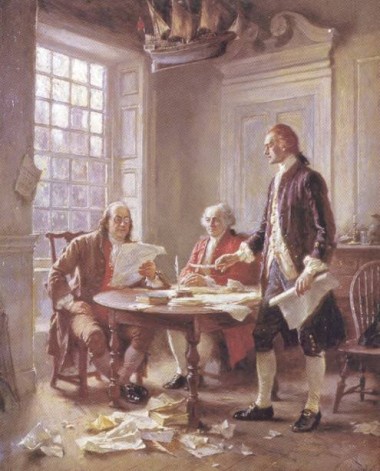
The next four days, July 1st through the 4th, are the jewels of American history. In Philadelphia in 1776, representatives of the thirteen American colonies were meeting to debate and approve a declaration of ‘self evident truths’ that would forever sever their dependent relationship with their mother country. At the junction of major turnpikes that entered like spokes of the wheel centered at the little town of Gettysburg, Pennsylvania in 1863, two massive armies would be drawn into cataclysm to determine if the declaration of those truths would continue as a singular expression. Fireworks and parades will remind us of the events, but it takes greater meditation to absorb the greater connection to our current lives, and we are often want to do so. It is hard to imagine in this time of malleable and ignoble commitment to truth, that there was a time when truth was felt to be so important to the quality of a person’s existence, that people were willing to fight, and as necessary, die for the principle of it. Yet, this country of ours is almost unique for the purified expression of all our economies of effort on the idea of principle rather than power as our fundamental reason for being.
The foundation of what is truth is not a historical constant. The truths that the men of Philadelphia, and later, Gettysburg were fighting to define were more humanistic than the stark clarity of Aristotle:
To say of what is that it is not, or of what is not that it is, is false, while to say of what is that it is, and of what is not that it is not, is true
This is the clarity of the perfect, absolute truth and requires only its discovery, not its interpretation. The rationalization of truth by later philosophers accepted the presence of a divine truth, but recognized man’s interpretive intellect and saw what was knowable could be achieved by reason. For Saint Thomas Aquinas, this was a divinely inspired capacity of man to use intellect to identify the existence and essence of things:
Truth is the conformity of the intellect to the things
By the time of the Enlightenment that would shape the thoughts of the writers of the Declaration of Independence, truth was an equally balanced reality of both experience and reason. As expressed by Immanuel Kant, experience was purely subjective without being vetted by pure reason, and reason without experience would lead only to theoretical illusions.

The men of Philadelphia were fully aware that their determination to sever ties with Great Britain amounted to more than a desire to go their own way. The ability to stir men to take up arms and potentially sacrifice themselves for a cause would have to be based on more than who owned the land mass called America, but rather in the age of Enlightenment, who better owned the truth:
We hold these Truths to be self evident, that all men are created equal, that they are endowed by their Creator with certain Unalienable Rights, that among these are Life, Liberty, and the Pursuit of Happiness
That an individual could perceive his own truth, the direction of his life, and ultimately determine his own fate accepted the superior position of each person to both experience and rationalize their experience to a moral end, without subservience to some outside force. It was no longer the province of kings to be infallible, but rather within the capacity of each individual man, experiencing the natural laws laid out by a Supreme Being, and rationalizing his best path within those laws, that would form the moral force of the new nation.
How would objective definition be inferred on the last two truths, as subjective and experiential, as liberty and the pursuit of happiness? The armies that faced each other at Gettysburg on July 1st both firmly believed in the declarative truths of Jefferson but were willing to fight and die for their evolved interpretation. The 20th century philosopher, Erich Fromm, recognized the historical nature of truth, based on the revealed truth available to the rational observer at any one time:
“the history of thought is the history of an ever-increasing approximation to the truth. Scientific knowledge is not absolute but optimal; it contains the optimum of truth attainable in a given historical period
To the forces of the north, the truths of the declaration were born out of the self evident nature of the process of truth, that all men were created equal. To have the republic exist in an atmosphere that blasphemed the foundational truth, where some men were held by other men as slaves, corrupted this truth, and threatened its self evidence. For the forces of the South, liberty and pursuit of happiness demanded each individual rationalize the interpretation of optimal truth, and not once again, have some distant outside power determine the direction and pace of their understanding. Laws that warped the ultimate individual pursuit of truth, were as such artificial, and could be nullified. Each saw themselves as upholding the truths expressed 80 years before, and were willing to impel the other side to accept their version, at the potential cost of ultimate individual sacrifice. Across the fields of Gettysburg would be decided who owned the truth of the Founders.
Over the next four days, the nation will crescendo to the celebration of the fourth day as the culmination of the unique moment of expression known as the American experiment. It was perhaps a necessary historical prism, that the declaration of one generation of Americans would be tested in such an extreme test of blood by another generation of Americans, and settled in the very same state, on the very same day on the calendar. It is the unfortunate ignorance of our time, that so many our current celebrators will have absolutely no understanding of the reasons for the celebration, or the events that occurred in Gettysburg that were its ultimate test.
Our current truths have now devolved to pure experience, and rationality has been demoted to the dustbin. Current thought has no precedence and needs no evidence. It is a child only of feelings and impulses. We see the truth as settled, because we want it to be so. We warp equality to force equality. We desire equality of outcome, not of opportunity. We see our science as existing to reinforce our ideals, not helping to define them. We live in a darker age where are willing to have a government exist as our superior arbiter in matters of ultimate truth, determining the elements of our health, the accepted norms of our education, even the means of our energy, the morality of our entrepreneurship, and the notion of our family. We are left to argue only our wants and are needs, not our aspirations and our challenges.
Within the next four days, a moment to remind ourselves about who we are, and how we came to be, offers an opportunity to retrench from our current waywardness. Celebrations are wonderful, but hollow without context. When you see the flag waving in celebration, look at the stars and stripes as reflections of the journey for truth this country was founded upon, and the constant struggle required to participate in such a journey. The men of Philadelphia in 1776 embarked upon a revolution, the men of Gettysburg fought to ennoble it. In these days of loose and corrupted values, we may need a another revolution, a revolution of truth, to secure the past sacrifices.
In a time of universal deceit, telling the truth is a revolutionary act
George Orwell